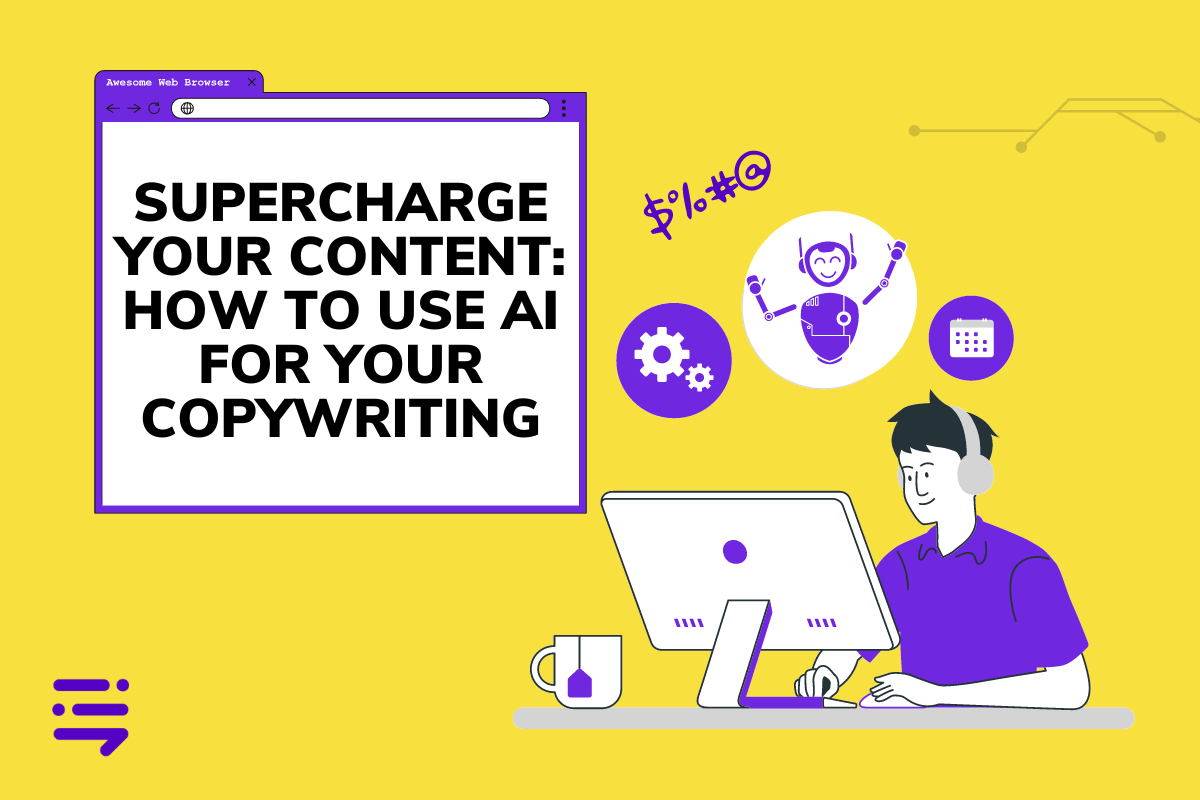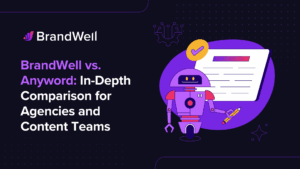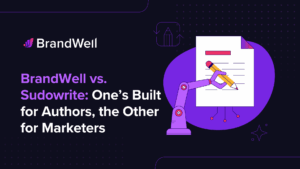Artificial intelligence is revolutionizing the way we write copy. This technology offers an unparalleled degree of efficacy and accuracy, enabling authors to generate compelling copy with less effort. Learning how to use AI for copywriting can totally change the way you scale your content marketing efforts.
Why do you need AI for copywriting? Because marketers are now shifting their focus to long-form content – which can be difficult to produce day after day without an AI writing assistant.
Last year, B2C marketers increased their use of long-form content from 22% to 42%. Why? Because articles with 900-1200 words attract 21% more traffic and 75% more backlinks than blog posts with only 300-900 words.
How does AI copywriting work and what are the benefits and challenges of AI software? We’ll share how to use AI for your copywriting projects so you can generate copy at incredible speeds without compromising quality.
Ready to take your content generation to another level? Let’s dive into the world of AI copywriting tools.
What is AI Copywriting?
AI writing software uses artificial intelligence (AI) to write copy. It employs advanced NLP and ML algorithms to mimic human copywriting and produce original, high-quality material for web pages, blogs, emails, and other digital content platforms.
AI copywriters can quickly generate hundreds of pages in a variety of formats, enabling businesses, marketing agencies, and freelancers to write optimized pieces without having to do it from scratch.
How do AI Copywriters Work?
To write copy, an AI copywriter tool requires data input so that it can learn how humans talk to each other. Once this is done, the algorithm will be able to identify patterns in human speech that it can use when generating new pieces of written work. The output will also be grammatically correct because the AI has already learned grammar rules within English language structures.
AI writing tools can be a potent resource, enabling the production of persuasive writing with great efficiency. While its benefits are evident, there are drawbacks that you have to take into consideration before adding AI copywriting tools to your content marketing plan. Let’s explore if AI copywriting is effective at generating copy and what successful projects look like.
Key Takeaway: AI copywriting is a technology that utilizes NLP and ML to swiftly generate top-notch material.
Is AI Copywriting Effective?
Efficient AI copywriting presents a range of potential benefits such as enhanced speed and precision. However, it is essential to weigh its pros and cons before embracing this technology.
Benefits of AI Copywriting Tools
- Improved accuracy in terms of grammar and spelling.
- Faster turnaround times on projects.
- Better insights into customer preferences based on data analysis.
- Provides valuable feedback about how readers interact with content.
- Allows users to generate ideas quickly by suggesting niche topics.
Drawbacks of AI Copywriting Tools
- Still requires human input to produce quality results.
- Needs clear and specific instructions to set up automated tasks.
- Lacks the creativity of human copywriters in coming up with original, engaging storylines.
- Devoid of human emotion like empathy.
The key to making the most out of this technology is balancing the pros and cons of AI copywriting. As such, learning how to use AI for copywriting projects is essential to maximizing its potential benefits.
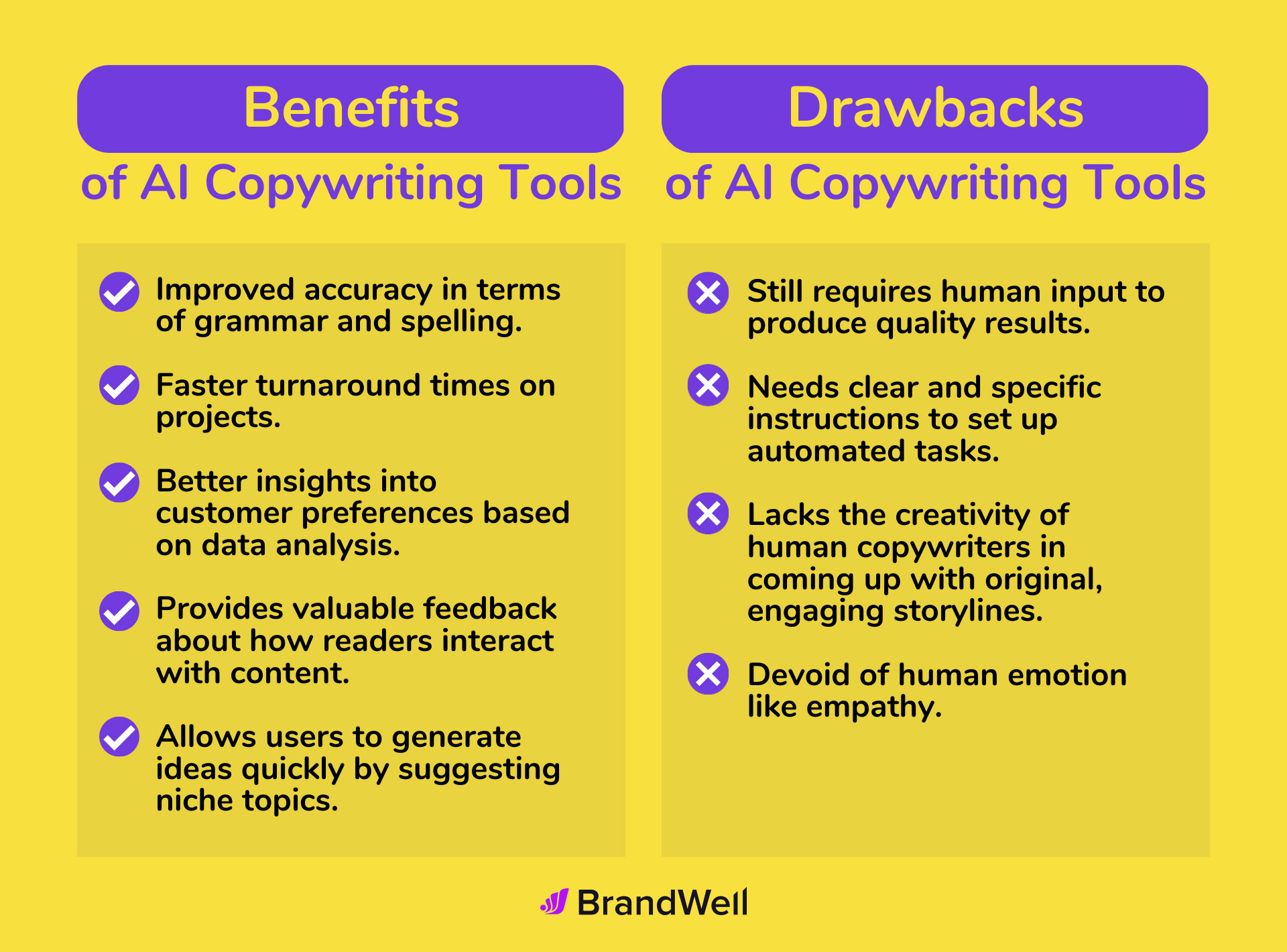
How to Use AI for Copywriting Projects
AI copywriting tools are becoming increasingly popular among content marketers and SEO professionals. Creating content can be done faster than ever before through the use of AI. But it’s important to understand the basics of machine learning and natural language processing before diving in.
How to use AI for your copywriting needs?
Identify the Right Tools and Platforms for Your Needs
When choosing AI-powered tools, it’s important to match the machine with your needs. Are you writing blog posts, website copy, or social media posts? Research which platforms offer features that meet those requirements.
Understand the Basics of ML and NLP
While it’s not necessary, learning the basic concepts of machine learning, neural networks, sentiment analysis, and natural language generation can help you understand how this all works. This will help you maximize the potential of these potent tools while ensuring that your output is always of a high standard.
Develop an Effective Strategy for Implementing AI in Your Writing Process
To ensure successful outcomes from using AI writing software in your content process, develop a clear strategy that outlines the following:
- What tasks should be automated?
- How much manual intervention is required?
- Who will oversee each step?
By utilizing AI for copywriting projects, businesses can gain efficiency and automation benefits and create more personalized content. It is essential to integrate best practices into your writing workflow as we progress through the evolution of AI copywriting.
Best Practices for Writing with AI
AI copywriting can be used in a variety of ways, from generating blog titles to crafting product descriptions and advertising copy.
Here’s how to use AI for your copywriting tasks.
Blog Titles
Most content writers don’t use the first headline they write, so instantly generating 20 more slight variations is appealing. AI copywriters can help generate blog titles that are relevant to your brand’s background and product details. This saves time on research as the AI can suggest topics that would be interesting for your target audience.
Product Descriptions
An AI copywriter can generate unique product descriptions by taking into account the features of each item you want to describe. This is especially useful when writing descriptions for multiple products with similar features, as it ensures each description stands out from the rest.
For example, Elvis might have used an AI content generator to write variations on product descriptions for his favorite shoes.
Advertising Copy
Crafting effective advertising copy requires creativity and an understanding of what will catch people’s attention amidst all the noise online. An AI writer can provide succinct yet impactful text that resonates with readers while also being SEO-friendly so it appears prominently in search engine results pages or feeds.
Social Media Posts
Social media posts are another popular way to use AI copywriting tools especially when you need to come up with hundreds of clever hooks a week. From social post hooks to video titles to YouTube description intros, AI content generators equip social media managers with tools they didn’t know they needed!
While AI may not be able to handle longer pieces of heartfelt writing just yet, it’s great at quickly generating lots of options and finding new ways to repeat itself in shorter pieces that require less structure and thoughtfulness.
Whether you need product descriptions, blog intros, or social media posts, no doubt using an AI content generator will help make your job easier.
Best AI Tools for Copywriting
AI writing assistants are designed to make your job as a copywriter easier. Which apps should you add to your toolkit?
Here are some of my favorites:
ChatGPT: ChatGPT can assist with various writing tasks, including copywriting. While not specifically tailored for copywriting, it can provide creative suggestions, brainstorm ideas, and help refine your writing.
Wordtune: Wordtune is an AI-powered writing assistant that helps improve the clarity, tone, and style of your writing. While it’s not focused solely on writing copy, it can be a useful tool for refining and optimizing content for various purposes.
QuillBot: QuillBot is an AI paraphrasing tool that can assist with rewriting sentences, paragraphs, or entire articles. It can help generate alternative versions of copy or refine existing content.
AIMEE: BrandWell‘s AIMEE chatbot is designed specifically for marketing copy. Unlike general chatbots, AIMEE is trained for ad copy, social media posts, email newsletters, website copy, product descriptions, and more.
Take a look at this ad copy written by AIMEE:
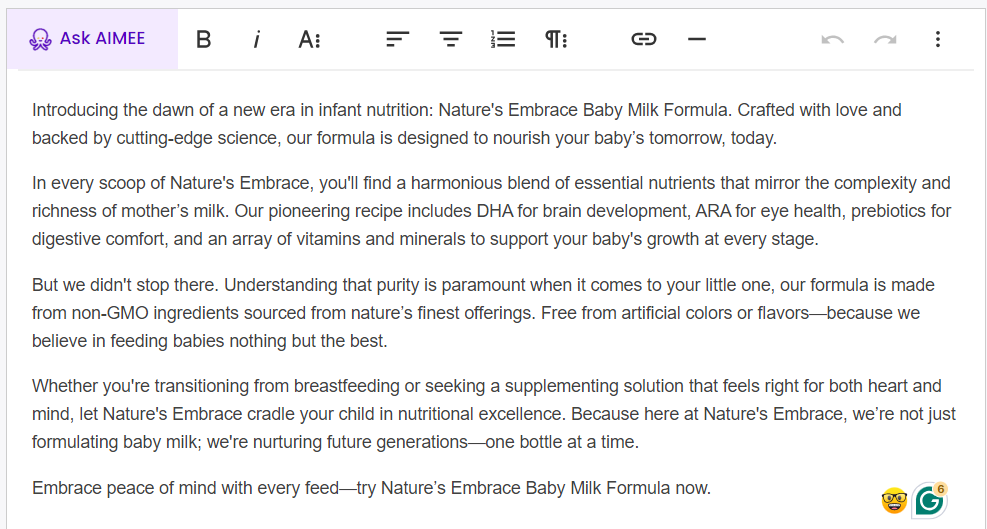
Remember, while these tools can be incredibly helpful for generating ideas and speeding up the writing process, it’s essential to review and edit the output to ensure it aligns with your brand voice and messaging.
Check out our complete guide on what are the best AI copywriting tools for more options.
How Good is AI Copywriting?
AI copywriting is an invaluable tool for content creators, but it’s important to understand its limitations. AI copywriters are excellent at producing quality content when the input is detailed and specific. However, they cannot function without the support of a human person and if your information isn’t strong enough, you won’t get the results you want.
When used correctly, AI copywriters can help create evergreen content that remains relevant to viewers for years to come. To get the most out of this technology, you should use it as a supplementary marketing tool rather than a replacement for your human writers.
An AI copywriter can help generate ideas or expand on existing ones by prompting you with questions or providing suggestions based on what’s already been written. This helps you create more engaging content that will capture readers’ attention and keep them coming back for more.
Will AI Replace Copywriters?
No, AI will not replace human copywriting. While artificial intelligence can produce content in minutes, it still has a long way to go before it can match the creativity and nuance of a human copywriter. This is why it’s important to learn how to optimize your content before publishing.
AI Is Not Creative Enough, Yet
When it comes to creative writing, AI is still far from being able to replicate the depth of skilled human copywriters. This is because current algorithms cannot come up with original ideas or think outside the box when generating content. Instead, they rely on existing data sets that are used as input for their output.
So while a machine may be able to produce decent-quality content, it cannot create truly unique pieces without any help from humans.
AI Lacks Nuance and Contextual Understanding
Another limitation of current AI technology is its inability to understand context and provide nuanced interpretations of language or situations. For example, if you asked an AI algorithm about how people feel about politics or religion, chances are that its response would be generic since these topics require understanding beyond what most algorithms currently possess.
On top of this, many algorithms also struggle with recognizing subtle nuances in language which means they often miss out on important details when processing text inputs or providing outputs based on them.
Humans Are Still Needed To Refine Outputs
Finally, even if an algorithm could produce perfect outputs every time (which isn’t likely anytime soon), there would still need to be someone around who could review and refine those outputs before publishing them publicly. After all, no one wants their website filled with robotic-sounding articles. In other words, while using an AI copywriter may save some time upfront by automating parts of the process, ultimately there needs to be a human who understands both the technical and emotional aspects behind creating good quality content.
While artificial intelligence has made great strides in copywriting, there’s still no substitute for a human copywriter when it comes to crafting creative pieces of content marketing.
Conclusion
AI tools are great for quickly generating ideas and helping to refine them, but they cannot form relationships with customers or do full audits of their needs. Ultimately, humans will still be needed to identify the best ideas and craft them into compelling copy.
In theory, AI copywriting tools could generate hundreds of taglines in minutes instead of having a junior copywriter spend an hour writing 20 taglines by hand. This would save time and resources while giving creative directors more options from which to choose when crafting their campaigns.
However, AI isn’t perfect. It cannot truly understand customer feedback or make meaningful connections between different pieces of data. It’s up to humans – specifically experienced copywriters – to take these raw materials generated by machines and turn them into something special that resonates with customers on an emotional level.
At its core, effective content marketing comes down to understanding what your customers need and giving it to them. Machines simply don’t have this capability yet — they need guidance from people who understand how words work in moving readers emotionally as well as intellectually.
How to use AI for your copywriting needs? With the right approach, you can leverage AI to make your copywriting process easier while creating more impactful results.
Why not give it a try? Sign up for BrandWell today.

